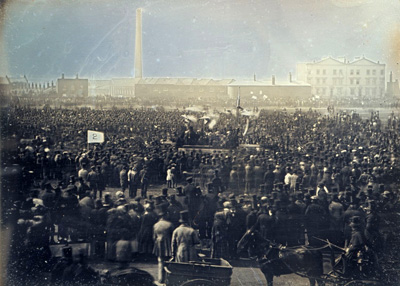- Home
- News
- Features
- Topics
- Labor
- Management
- Opinions/Blogs
- Tools & Resources
Can Co-Operatives Conquer Capitalism And Change The Way The World Works?
Co-operative By Nature
Despite Mondragon’s success, we live with an economic system inimical to the spirit of co-operation. Competition and efficiency are its watchwords. You could even say it is systemically uncooperative, based on individuals operating in their own self-interest.
The rightwing icon Ayn Rand mythologized unbridled capitalism as the pinnacle of freedom. It was Margaret Thatcher, in her attack on the ‘nanny state’, who put it most baldly in 1987. She said ‘there is no such thing as society.’
Thatcher’s heir in Westminster is both more cynical and more devious.
David Cameron’s ‘Big Society’ formulation calls on citizens to pick up the pieces after the state withdraws from the provision of social services. His idea is, help each other because you’re on your own. In the end the vision is the same.
And yet we are a supremely co-operative species by nature. How else to account for our ability to survive and prosper in every corner of this planet, from the frozen Arctic tundra to the blistering Australian outback?
Meeting Reality And Human Nature
Harvard math and biology professor Martin Novak describes co-operation as the “master architect” of evolution.
Sometimes reality does not always live up to theory.
Co-ops operate within market structures and must rely on human beings to make them work. The competitive market is ruthless. If you can’t compete you get trampled.
Co-operation can sometimes drift into co-optation. And people are well, people sometimes nasty, selfish, lazy, opinionated, bull-headed. While co-operation for mutual benefit is a good idea, the road may be bumpy.
In his recent book, Wired for Culture: Origins of the Human Social Mind, the evolutionary biologist Mark Pagel argues that culture is made possible by social learning, which in turn depends on co-operation. For example, evolution allows co-operation to flourish within groups but not necessarily between them.
The Push And Pull Of Cooperation
“It is our uniquely human sense of social and cultural relatedness that makes our co-operation work we are prompted to behave well toward each other; but even slightly perceived differences can end in xenophobia, racism, and extreme violence.”
The same drive that pulls people together can also cause them to turn on anyone different as a perceived threat.
Choose your own horror. The list is endless: Stalin’s Gulag, the poisonous anti-Semitism in Nazi Germany, the slaughter in Rwanda, the carnage in ex-Yugoslavia.
The co-operative urge, while strong and innate, does not always lead to sweetness and light.
Middle-class budgets are strained. Young people can’t find meaningful work or affordable housing; the ranks of the poor are growing. Social services are cut and the welfare state is dismantled.
People can co-operate for bad ends as well as good. Street gangs co-operate, but so do surgical teams. Building bridges of mutual understanding and eroding both tribal and group frontiers has to be at the forefront of the co-operative vision.
End Game Issues
We’ve got some endgame issues facing us as a species, problems which will require us to co-operate at a global level if we are to get through the next century without catastrophe.
Climate change, resource depletion, ecological collapse and galloping consumerism: these are challenges few business or political leaders have the courage to confront. The UN itself is a chequered attempt to unite the peoples of the world in a common project of peace and prosperity. It has been fraught, to say the least.
We can no longer afford the free-market shenanigans of the past decade, the freewheeling state-capitalist Chinese model or the dead hand of traditional communism. We will have to do much better.
Co-operatives can point the way towards a different kind of economic model, where people control capital and not the other way around.
A little real democracy wouldn’t hurt.
NOTES on sources
1. Las Empresas Recuperadas en la Argentina, Andr s Ruggeri, Open Faculty Programme, University of Buenos Aires, 2010.
2. ‘Worker-run factories in Argentina continue to thrive, boosting the economy and influencing workers in other countries’, Marcela Valente, IPS, 12 Nov 2010.
3. ‘The implosion of capitalism’, Chris Hedges, Truthdig, 30 April 2012.
4. ‘Can there be good corporations?’ Marjorie Kelly, Yes Magazine, Spring 2012.
5. Wired for Culture, Mark Pagel, WW Norton 2012.
List your business in the premium web directory for free This website is listed under Human Resources Directory





